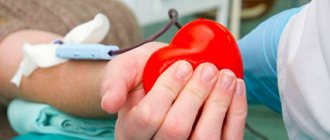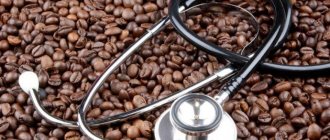Most men and women find it difficult to imagine the morning without a cup of coffee. Natural coffee has an invigorating effect on the human body, has a pleasant aroma and taste. This drink is loved by many people, and quite often, when passing by a coffee shop, they simply cannot resist having a cup of coffee with a croissant, chocolate candy or other sweets.
When consuming certain foods and drinks, it is very important to know what effects they have, for example, which ones contain useful and harmful substances. Therefore, we will discuss these and other issues. The largest suppliers of coffee are Vietnam, India, Ethiopia, Mexico and Brazil. It is grown on small trees. You can prepare an aromatic coffee drink from dried and already roasted beans, as well as from green beans (collected from trees that produce green fruits).
To make it more convenient to use, we have developed a special method for processing coffee beans. This method is called the sublimation process. After this process is completed, coffee is obtained, which in the modern world is called instant coffee. Such a drink, unfortunately, loses its wonderful aroma and taste, for this reason they have to be replaced with the help of various artificial additives. Every coffee lover needs to know that coffee has a fairly strong effect on various organs of the human body, in particular the liver.
The effect of coffee on the liver
It should be noted that the opinions of scientists regarding the effects of this drink, unfortunately, are ambiguous. Some argue that coffee is a so-called poison for humans, while others say that it is very beneficial. According to the latest data, it is known that drinks containing caffeine protect the liver from the effects of alcohol, fat deposits, and excessive amounts of iron in the human body.
Based on these facts, we can conclude that coffee, first of all, will benefit those people who are overweight, drink alcohol very often, as well as those who have been diagnosed with high levels of iron. It is generally accepted that caffeine activates the liver and promotes the production of liver enzymes. As traditional medicine says, bitterness in small quantities benefits the liver. Just don’t overdo it with this product; everything is healthy when eaten or drunk in moderation.
According to numerous studies by modern scientists, coffee has a beneficial effect on the liver if, of course, it was consumed in an acceptable amount. They also established the daily dose of coffee for humans. It is equal to 300 milligrams. This amount is contained in approximately three cups of good, strong natural coffee. When it comes to instant drinks, things are pretty bad. When consumed, it has an extremely negative effect on the body.
This drink can cause the occurrence and development of all kinds of diseases and inflammatory processes occurring in the human body. Regular consumption of instant coffee can harm the liver and make it more vulnerable. Modern medicine claims that all harmful components to enhance the taste and aroma of instant coffee are used in very large quantities.
The benefits of coffee for the liver and the whole body
High-quality natural coffee contains a huge number of components that have a beneficial effect on the body. This does not apply to soluble varieties, which lose most of the beneficial substances during their production. The table shows the chemical composition of the coffee drink and the properties that each of its components has.
| Substance | Beneficial features |
| Aromatic compounds | They have a similar effect to aromatherapy - they calm the nervous system and activate metabolic processes. |
| Caffeine, trigonelin | These substances belong to the group of alkaloids that affect the nervous system and psychological state. They act on the central nervous system, relieving the feeling of drowsiness. In addition, they stimulate blood circulation, as a result of which the liver receives all the necessary substances in sufficient quantities. |
| Organic acids | These natural acids affect the functioning of the gastrointestinal tract. Under their influence, the metabolic processes of proteins, fats and carbohydrates are normalized, which relieves additional stress on the liver. |
| Vitamins | B vitamins are involved in all metabolic processes. They restore the structure of the walls of blood vessels, speed up metabolism and energy. |
| Nitrogenous components | These components are necessary for the construction of new proteins. The function is useful for the liver, since normally it should be constantly updated. |
| Minerals | Minerals are necessary for proper carbohydrate metabolism. This process occurs partly in the liver, where glucose and its derivatives are converted into glycogen. |
| Tannin | Tannins protect the liver from the effects of free radicals. When they enter the body, pathological reactions of lipid peroxidation are blocked. As a result, the liver can be protected from premature aging and apoptosis (programmed death) of hepatocytes. |
Benefits of coffee
If you drink no more than 3 cups of natural coffee per day, it will be beneficial for the liver and will be an excellent preventive measure for pathological conditions of this organ. That is, the drink prevents the appearance of liver fibrosis, gallstones, the development of cancer of this organ, promotes the regeneration of liver cells, and reduces the concentration of iron in the liver. In addition, natural coffee neutralizes toxic substances, alcohol, and reduces the amount of histamine released. This drink is useful as a prevention of liver cirrhosis and is necessary for normalizing lipid metabolism.
Beneficial properties of coffee
Many coffee drink lovers are interested in whether coffee is okay for pancreatitis or not and how much it can harm the gland. There is no direct relationship between pancreatitis and coffee products. Why coffee itself will not become a factor in the development of pancreatic disease, and coffee can be drunk without changing natural digestion.
coffee beans
The product contains a sufficient number of positive properties.
- Vitamin P. It tones, prevents the aging process, and helps strengthen blood vessels.
- There are useful components - potassium, calcium, iron, magnesium.
- There are antioxidants that help maintain youth.
- Reduces the threat of developing cancer and Parkinson's pathology.
- Used to prevent diseases: liver cirrhosis, asthma, heart attack, diabetes, atherosclerosis.
- Improves male reproductive function.
- Stimulates the digestion of food while losing weight.
- Caffeine is used for intoxication with poisons, narcotic drugs, and cardiac dysfunction.
- Stimulates mental activity. Coffee will help you adapt during times of stress.
- Drinking coffee without sugar will protect your teeth from caries.
There are two types of inflammation of the pancreas, for which separate rules for taking the product are calculated.
The chronic form of pancreatitis often manifests itself in those patients who do not follow the diet of acceptable foods and drink alcohol. It is important to remember that the product is not capable of causing chronic pancreatitis, which provokes an attack. During an exacerbation, after eating, the patient feels pain in the stomach, he experiences nausea and sometimes vomiting.
a cup of coffee
If the patient is susceptible to developing inflammation of the stomach and pancreas, and the pathology is in remission, drinking coffee with pancreatitis is not recommended.
Can you drink coffee with acute pancreatitis? The acute development of the disease is characterized by pain in the stomach area, appearing regardless of the consumption of food. In the acute period, even a small amount of caffeine can cause:
- severe pain;
- flatulence;
- bowel disorders;
- nausea;
- vomiting.
It is for these reasons that it is not recommended to drink the drink during this period.
What are the dangers of excessive consumption?
Drinks consumed in quantities exceeding the recommended dose will negatively affect the condition of the entire body, including the liver. An overdose can cause various ailments and exacerbation of existing diseases in a person. Use at very high blood pressure levels (that is, during hypertensive crises) is harmful. This invigorating drink contributes to the deterioration of blood circulation in the human abdominal organs, except for the kidney organs. In case of overdose or frequent use on an empty stomach, the following occurs:
- production of excess bile, which can cause ulcers
- deterioration of glucose metabolism;
- dysfunction of liver cells, which occurs during the entire process of cholesterol distribution.
If, after drinking, you feel a deterioration in your overall health, or unpleasant symptoms occur that may indicate a disruption of the liver or other organs or systems, you should abandon this drink and immediately consult a doctor. Comprehensive diagnostics is a mandatory measure necessary in such a situation.
Drawing a conclusion, let's say that natural coffee in small quantities benefits the human body. When abused, as well as when consuming an instant drink, it undoubtedly causes harm. Now you know whether coffee is harmful to the liver, whether it is beneficial, you can wisely include it in your diet.
vashapechen.ru
When is coffee prohibited?
Due to the high caffeine content, drinking the drink has its limitations. Its invigorating effect is not always beneficial for the body. There is a whole list of conditions and diseases in which coffee can seriously harm your health. Cases when coffee is contraindicated:
- Gastrointestinal diseases: gastritis, gastric ulcer, pancreatitis, dysbacteriosis, poisoning.
- Cardiovascular system disorders: arrhythmia, arterial hypertension, atherosclerosis, varicose veins, strokes and heart attacks.
- Mastopathy.
- Uterine fibroids.
- Urolithiasis and other diseases of the kidneys and bladder.
- Hyperthyroidism.
- Allergy, psoriasis.
- Pregnancy.
- Children's age up to 10 years.
Drinking coffee will have a positive effect on both the liver and the entire body only in the absence of absolute contraindications. The main thing is to drink it correctly and in moderation so as not to harm your health.
Which type of coffee is more harmful – natural or instant?
Everyone knows that coffee stimulates the central nervous system (CNS) and simply invigorates. Actually, that's why they drink it. Does coffee, in addition to the central nervous system, affect other systems or organs, for example, the gastrointestinal tract? And if it does, how? And what type of coffee is more harmful – natural or instant? The debate on this topic has not subsided for a long time; the data varies, as does the information about how much caffeine is contained in each type of coffee. Of course, a lot depends on the brand, both regular, ground and instant coffee. The more expensive the coffee, the more caffeine it usually contains - this rule applies to all types of drink. But the most expensive, however, is coffee that is completely decaffeinated - but the issue here is the expensive decaffeination technology.
The daily dose of caffeine has long been established and, it seems, is recognized by everyone - 300 mg per day - a dose that does not cause harm to a healthy person. A 250 ml glass of regular ground coffee contains between 180 and 250 mg of caffeine. It turns out that you can only drink a couple of cups. But everyone gives different figures for the caffeine content in instant coffee, and it is difficult to check them - from 90 mg to 200 mg (and even more) per 200 ml. But in any case, it is clear - anything more than a glass is already on the verge, and if such doses are abused, the harm of coffee will not take long to occur.
Negative effects of coffee on the body
For a patient with pancreatitis, coffee is considered a dangerous product. The beneficial properties are offset by the negative effects on the human body suffering from inflammation of the pancreas.
Harm to the body manifests itself in:
- Caffeine addiction. A lack of a substance in an already accustomed body causes headaches, irritability, fatigue, and depression.
- Overexcited. Leads to nervous exhaustion, which inhibits the recovery of the pancreas.
- Increased blood pressure, dangerous for people suffering from diseases of the cardiovascular system.
- Interference with the absorption of beneficial microelements: calcium, magnesium, sodium, potassium, and B vitamins.
- Increased cholesterol levels and stimulation of appetite, causing obesity. A decaffeinated drink produces a similar effect.
- Increased acidity, because the secretory function of the gastrointestinal tract increases.
During pregnancy, coffee increases the risk of miscarriage and abnormal fetal development (low weight, height, caffeine addiction).
Children are not allowed to drink the drink. Coffee leads a child to a constant feeling of anxiety, fears, inadequate reactions to the surrounding reality, and urinary incontinence.
Harm from coffee. The stomach takes the first blow!
Is the harmfulness of coffee determined only by the caffeine content? No, and basically, if we are talking about the digestive organs - the stomach, liver and pancreas, caffeine here is inferior in the degree of harm caused to the chlorogenic acids contained in coffee. It is they that determine the acidic environment of the drink, it is from them that people develop heartburn after drinking coffee, it is they that lead to irritation of the gastric mucosa, which leads to excessive formation of hydrochloric acid and its effect directly on the gastric mucosa.
This is why drinking coffee in the morning on an empty stomach is so harmful. After all, during the night our stomach is free of food and is ready for the start of a new “working” day, and suddenly such an irritating substance is poured into it. But you can get even more harmful from coffee if you drink coffee and don’t eat anything - because then the hydrochloric acid, having been released, will have nowhere to be spent, and it will begin to digest the stomach’s own tissues. This process, which is repeated often (and the habits of coffee drinkers have not changed for decades), leads at least to gastritis, often to an ulcerative process, and an ulcer, untreated, with uneven, dense edges and a bumpy bottom, is already the subject of research in the science of oncology. Simply put, there will already be a conversation about stomach cancer.
Instant coffee is the most harmful for the stomach - this has recently been decided by the majority of scientists in the world. Moreover, drinks that differ in the processing of coffee beans have the same effect on the body - whether powdered, granular, or freeze-dried coffee. And in a drink made from ground coffee, the most harmful thing is the grounds, which contain tannins that lead to all the above processes. Therefore, if you drink coffee, then only from a coffee maker with a filter, and it is better to use disposable filters.
The harm of coffee drunk on an empty stomach is very strong, but when is the best time to drink coffee? It turns out that it is best to drink coffee after a meal, but not immediately. If you immediately wash down the food you eat with coffee, then mixing with it, the coffee significantly disrupts the process of primary processing of food by stomach enzymes and causes significant harm to digestion. It is optimal if coffee enters the stomach an hour after the main meal. This time is the “height” of digestion and the released hydrochloric acid will be included in the process. Apparently, the ancient rule according to which coffee was served after a meal, setting a separate table not where they dined, but in another room, was not just a beautiful tradition, but also a tribute to preserving health.
Chronic pancreatitis
During the remission stage, coffee can be consumed with the permission of the attending physician. If the last attack of exacerbation occurred a month ago, it is allowed to introduce the drink into the diet. It is unacceptable to drink instant coffee! An exclusively natural option is suitable for consumption; it contains fewer preservatives, which aggravate the situation. It is better to supplement the drink with milk, this will soften the effect on the body.
Caffeine activates digestive processes, stimulating appetite and pancreatic secretion. In the absence of food, the secretory fluid begins to process the organ. By drinking coffee on an empty stomach, the patient provokes an attack of exacerbation of pancreatitis. Chlorogenic acid contained in coffee irritates the stomach lining, leading to an increase in the production of gastric juice, which stimulates pancreatic secretion.
If it is difficult to live without your usual drink, it is recommended to drink high-quality types in small volumes, focusing on the sensations that arise in the body. If pain and other symptoms do not occur, then why not take advantage of the aromatic drink.
Still, doctors recommend stopping drinking coffee, preventing the risk of complications and dysfunction of the pancreas.
Coffee is harmful to metabolism
Different sources evaluate coffee differently in terms of its carcinogenic properties - even publications have appeared about coffee as a useful antioxidant that protects us from the diseases of civilization. But the Harvard School of Physiologists - quite trustworthy scientists - believe that coffee is precisely the cause of the development of oncological processes not only in the stomach, but also in the liver, pancreas and even in the bladder.
These studies are quite serious. The liver perceives coffee, even when healthy, as an irritating poison and fights it accordingly. With a long struggle, the harm of coffee becomes inevitable, reserves are depleted and the development of metabolic liver damage, for example, fatty degeneration, becomes possible.
What other harm does coffee cause to human metabolic processes? The drink itself does not contain any special minerals or vitamins, but it categorically interferes with the absorption of some beneficial macroelements, such as calcium. Therefore, you need to drink calcium supplements either an hour before drinking coffee, or two hours after drinking coffee (this rule also applies to tea, because it also contains caffeine - it is this substance that binds with calcium and forms insoluble compounds that are therefore not absorbed by the body) . Coffee addiction, especially in adolescence, leads to the early development of osteoporosis due to a lack of calcium, and this affects the figure and posture of very young people.
Coffee stimulates the appetite, this is also well known. That’s why most, if not all, diets require those who are planning to use them to completely give up coffee, since even with a small cup of “vigor”, many diets don’t work! In addition, coffee is a diuretic. This is a fact beyond doubt. And taking diuretics is a serious matter, often not always recommended for everyone. Therefore, the harm of coffee when consumed abundantly and frequently leads to dehydration of the body.
There is one more detail - coffee dulls the feeling of thirst, this happens at the level of the brain, and a dehydrated body does not signal a serious problem. The man doesn't want to drink! So it turns out that some people, due to certain circumstances, are forced or have decided to calculate for themselves how much and what they drink per day, in horror they realize that they only drink coffee all day - a few cups, and nothing more. In this mode of intake, the harm of coffee will definitely manifest itself, since the diuretic properties of the drink have a far worse effect on the kidneys (they are constantly, as it were, “spurred up” unnecessarily). In addition, dehydration is harmful for blood pressure and cardiac activity, but, like other diuretics, caffeine removes potassium, disrupting the smooth functioning of the heart, leading to dystonia and brain hypoxia.
Here comes a paradox - we drink coffee to raise blood pressure, and at first we increase it, but then, due to the diuretic effect, we lower it again. Such “swings” are poorly tolerated by a person, and even more so by those suffering from vegetative-vascular dystonia, for whom everything is already “unbalanced.” That’s why it’s customary in the East, but for some reason it hasn’t caught on with us - to serve a glass of plain, clean water with coffee - as much coffee as you drink, so much water is added!
This is how the aromatic drink of coffee acts on the gastrointestinal tract and human metabolism.
www.ovrede.ru
What to replace
Today on the market it is possible to buy a caffeine-free product, which is the safest.
To experience a taste similar to a coffee drink without side effects, you can replace it with another one. This procedure will allow you to completely abandon it.
It would be inappropriate to replace coffee with cocoa in case of pancreatitis, since it is unsafe for pathology due to stimulation of secretion.
It is recommended to drink chicory for pancreatitis of the pancreas, which exhibits many positive properties:
- restoration of pancreatic function;
- removal of bile from the body;
- improvement of heart function;
- normalization of metabolic processes;
- relief from constipation.
In case of pathology of pancreatitis, chicory is an additional element for complex therapy; it is also taken as food for high sugar. But it is unacceptable to drink it during an exacerbation of chronic pancreatitis and during the course of an acute illness.
chicory for pancreatitis
Insulin, which is present in chicory, helps improve intestinal microflora and reduce the amount of sugar in the circulatory system. Chicory is indispensable for illness due to impaired insulin production.
The drink should be introduced into the diet gradually, with a small concentration. Initially, 0.5 teaspoon per 250 ml of water. To sweeten, add a spoonful of honey.
green coffee
In case of pathology, the green product can get rid of fat cells. Based on the results of the study, it was revealed that this drink has no side effects.
Thanks to the consumption of green varieties, the following occurs:
- stimulation of blood flow;
- activation of metabolism;
- the antispasmodic effect leads to normal functioning of the liver and gastrointestinal tract, and the bile ducts are well cleansed.
green coffee
If you drink green, the following changes will be observed:
- weight loss thanks to chlorogenic acid;
- motor activity will increase;
- Brain performance will increase due to tatin, which activates brain function.
By consuming the green type of product, the general well-being of a patient with pancreatitis will improve, and most of the factors that accompany the disease will go away over time.
In addition, the ground natural product will not harm the pancreas, since it does not contain caffeine.
It is also acceptable to drink the product using low-fat milk or cream. Milk products can eliminate harmful enzymes, making the drink not very concentrated. Recommends consuming it according to a special plan - half an hour after eating.
with milk
It is not recommended to use the components separately; this will lead to the development of:
- heartburn;
- diarrhea;
- overexcitability of the nervous system.
In addition, there is a significant effect of the drink on the stomach; it will become inflamed, which will lead to a persistent feeling of discomfort with heaviness.
Before adding a drink containing a dairy product to your diet, consult your doctor, as gas may form.
Is coffee harmful for inflammation of the pancreas?
Unfortunately, most gastroenterologists are inclined to believe that coffee should not be consumed for pancreatitis, and the ban applies to patients suffering from pancreatic diseases in both forms - acute and chronic.
The drink itself, according to research, does not lead to disturbances in the functioning of the digestive system, including the development of pancreatitis, therefore it is not contraindicated for people without pathological changes in the functions of the gastrointestinal tract. But if the disease is chronic, caffeine may well contribute to its exacerbation, which can worsen the already weakened pancreatic function.
You should treat yourself more carefully when, after drinking a cup of drink, unpleasant sensations arise in the epigastric area and the gland itself. In this case, you need to either stop drinking coffee completely or drink it after a hearty breakfast.
Effect of caffeine on the pancreas
Today people are often interested in the question of the effect of coffee on the pancreas. There are many legends and doubts associated with the consumption of coffee drink, some of them are completely unfounded. At the same time, caffeine has a complex effect on humans. It can be both useful and harmful. For example, if you drink a lot of coffee before going to bed, this largely affects melatonin, the sleep hormone that is produced when a person is resting.
For a healthy pancreas, caffeine intake is not dangerous, it does not pose a threat, and does not block the complex and multi-tasking process of gland functionality.
Is it possible to drink coffee if you have pancreatitis? Caffeine contains active elements that activate the functionality of digestion. If you consume a cup of caffeine in the afternoon, it is beneficial and helps to better break down foods.
Drinking coffee on an empty stomach stimulates the pancreas and stimulates the production of food enzymes. The gland receives a signal that it needs to start its work. The process of enzyme productivity occurs, but there is nothing for them to act on, nothing to digest and generalize, since the person has not eaten. Thus, drinking caffeine provokes idle activity of the pancreas.
The produced enzymes remain and begin to act on the digestive structure. When digestion is already impaired, such an effect on it can become dangerous. So, when there are problems with the organ, the coffee drink is consumed carefully.
In case of chronic diseases of the pancreas, for example, with pancreatic pathology, it is recommended to remove coffee from the menu altogether. Especially when the disease worsens. During the period of stable pathology, drinking 1-2 mugs of coffee after meals is allowed.
When summarizing all the main concerns regarding the effect of coffee on the pancreas, they can be attributed to the following issues:
- Does caffeine interfere with the functionality of the pancreas? – It works as usual;
- Can the product cause pain on an empty stomach when the organ is already sick? – this process is possible;
- Is it permissible to consume caffeine when there is inflammation and other pathologies of the pancreas? - only with the permission of a physician, taking into account the intake after meals, the stomach should not be empty. You are allowed to drink no more than two standard cups per day.
Doctors agreed that taking an instant drink has an adverse effect on the pancreas. Chemical elements processed by caffeine have a negative effect on the pancreas, leading to the destruction of the parenchyma. Natural drinks for pancreatitis have a much gentle effect, even if the organ is sick.
If, after consuming the product, you feel pain that spreads to the pancreas, to the left side of the peritoneum and lower back, then you should immediately stop drinking coffee drinks and get examined by a doctor.
What are the dangers of coffee and similar drinks?
Coffee contains not only caffeine, but also chlorogenic acids, which can negatively affect the pancreatic mucosa. In addition, the drink leads to an increase in the secretion of gastric juices, thereby stimulating the secretion of the gland. As a result, a patient with disorders in this organ experiences not only pain, but also nausea, and heartburn may occur.
Coffee for pancreatitis is quite capable of exacerbating this disease. The same can be said about strong tea drunk on an empty stomach.
Caffeine helps activate the nervous system, which is not at all indicated for gland disease. Regular consumption of the drink leads first to overwork of the central nervous system, and then to physical fatigue and exhaustion. All this adversely affects the process of recovery of the pancreas after an illness. In addition to increasing the load on the nervous system, caffeine stimulates appetite and even overeating.
A coffee drink interferes with the absorption of some valuable microelements, which include magnesium and calcium. Caffeine also flushes out potassium. Deficiency of these substances impedes the recovery of patients after the acute phase of the disease.
Not many people know that when making instant coffee, some manufacturers add additional chemical components, which, if pancreatic function is weakened, can cause further deterioration in its functioning.
Coffee for pancreatitis and cholecystitis
Pancreatitis is caused by inflammatory foci on the lining of the pancreas. Increased secretion of enzymes leads to independent digestion of its own gland. This process is caused by poor nutrition and leads to acute attacks of pain.
One of the substances that contribute to the rapid formation of an attack is caffeine. During acute attacks, the consumption of not only instant, but also ground natural coffee is prohibited.
The negative effects are due to caffeine and chlorogenic acids, which contribute to irritation of the stomach and pancreas. The consequences of drinking coffee for pancreatitis may be:
- Pathologies in the absorption of nutrients required by the body;
- Increased appetite and, accordingly, overeating;
- Increased appetite for sweet foods;
- Excitation of the central nervous system;
- Increased heart rate;
- Increased secretion of gastric juice.
Instead of classic coffee (instant and instant), experts recommend drinks such as:
- Chicory with added milk;
- Jerusalem artichoke coffee;
- Herbal teas;
- Decaffeinated coffee;
- Weak coffee with added milk.
Coffee with milk for pancreatitis
After suffering from acute pancreatitis, you should not drink any caffeine-containing drinks. If the patient has a stable remission of the disease and cannot imagine himself without caffeine, you can prepare a drink very diluted with milk. Moreover, you need to choose natural coffee, and milk should be added to it in large quantities. It is better not to introduce such a drink into the diet without consulting a gastroenterologist, so as not to contribute to an exacerbation.
You can drink coffee with milk only after a good hearty breakfast, or even better - after half an hour or even an hour.
If discomfort in the pancreas, pain, or heartburn occurs, this drink must be avoided.
For chronic pancreatitis, without exacerbation, it is allowed to drink about 200 ml of this drink with the addition of milk. The same recommendations apply to strong tea.
If desired, coffee can be replaced with a chicory-based drink, which does not have a negative effect on the digestive organs and pancreas. But even on this matter it is worth consulting with a specialist.
Whether coffee is good or bad for you can find out by watching the video:
peptic.ru
What kind of coffee can you drink if you have pancreatitis?
To minimize the harmful effects of coffee, but still feel the taste of your favorite drink, you can replace it with alternative options, each of which has its own advantages:
- From coffee beans. Instant drinks contain flavor enhancers, preservatives and other chemical compounds, so they are strictly contraindicated for pancreatitis. Natural coffee is allowed to be used only with the permission of a doctor.
- Chicory. The drink contains minerals, vitamins and pectins, but does not contain caffeine. Chicory tastes like coffee and has its own positive qualities: it stimulates the functioning of the gastrointestinal tract, removes bile from the body and speeds up metabolism.
- Coffee with milk. To prepare, dilute coffee with milk in a 1:1 ratio. The dairy product neutralizes the effects of caffeine and prevents calcium leaching. It is better to take milk that is skimmed or with a minimum percentage of fat content.
- Green coffee. Has a weaker concentration of caffeine. Promotes the breakdown of fat cells, accelerates blood circulation and flushes the bile ducts.
Green coffee is known for its beneficial properties
Natural black or instant
Black coffee is strictly prohibited for people suffering from pancreatitis, both during exacerbation and when signs of pathology are weakening. The drink has a strong irritant effect on the gastric mucosa, stimulates increased production of bile and pancreatic juice, damaging pancreatic tissue. Drinking black coffee on an empty stomach when very hot can lead to an exacerbation of painful symptoms.
The share of coffee beans in an instant drink: 10-15%, the rest consists of flavorings, flavor enhancers and preservatives. Regular consumption of such drinks can lead to toxic poisoning, irritation of the mucous membranes of the stomach and gastritis.
Important! It is strictly forbidden to drink black and instant coffee even during the period of remission of the disease.
Espresso for pancreatitis
Espresso is a strong drink with a high concentration of caffeine, which is strictly not recommended even if the symptoms of the disease disappear. The only way to drink this type of coffee is to wash down each sip with cool water. This way you can enjoy the taste of your favorite drink and soften its effect on the gastrointestinal tract. Drinking espresso in its pure form is contraindicated.
Green coffee
Green coffee may even be beneficial for pancreatitis in remission. The most significant feature of the drink is to burn fat. The female half of the population over 32 years old can lose up to 10 kg in 7 days.
Additionally, green coffee improves blood circulation, stimulates the metabolic process, cleanses the bile ducts and stabilizes the digestive system. If a person drinks coffee regularly, his motor activity will improve, brain performance will increase, and excess fat will soon disappear.
Important! In any case, it would be a good idea to consult your doctor on this issue. And green coffee should also be consumed in limited quantities, because... it, like black, contains caffeine.
Is it possible to have coffee with milk?
Coffee with milk is often allowed by doctors when the signs of pancreatitis have eased. In this case, the drink should be consumed:
- No more than 1 glass per day.
- An hour after eating.
- Warm, but not cold or hot.
- Made from natural coffee beans. Instant drinks are completely excluded.
Failure to comply with the above requirements may cause heartburn, gas and colic.
Is it possible in the morning on an empty stomach?
Once in the body, coffee stimulates the release of chlorogenic acids, which must digest the food received. When the drink is taken on an empty stomach, the interaction is disrupted, resulting in damage to the tissue of the stomach walls. Heartburn, diarrhea and pain occur; if you constantly drink coffee on an empty stomach, gastritis or an ulcer can develop.
In the morning, people's hormonal levels change; the concentration of the cheerfulness hormone cortisol, which is responsible for attention and concentration, increases. Coffee beans muffle this effect. If a person drinks coffee on an empty stomach constantly, his central nervous system is depleted, he becomes more tired and irritable.
Which coffee should you choose?
When choosing between two main varieties - natural and instant coffee - it is strongly recommended to pay attention to the fact that the first of them is more preferable. This is explained by the naturalness of the raw materials used for its preparation. While in the process of preparing an instant drink, Robusta is used. When we talk about this, we mean the lowest grade varieties in the “coffee” hierarchy.
In addition, various additional components are used in the process of producing instant drinks. We are talking about dyes and flavors that help improve the taste and color characteristics of the product.
How does coffee affect the liver?
Coffee is a kind of drink that can tone the body and give additional energy. Coffee culture has a huge number of ways to prepare this drink, and stores offer a wide range of different varieties and manufacturers.
The effect of coffee on the liver and the body as a whole is still controversial. Some doctors prescribe it to have medicinal properties, while others say it is harmful if consumed regularly.
This factor largely depends on the quality of the coffee beans, the method of their preparation, as well as on the individual characteristics of the person.
Could there be a positive effect?
Speaking about the global influence of coffee, namely the effect on the body as a whole, it should be understood that it can have a tonic effect. Such an effect will develop solely due to the influence of caffeine, at the same time, the severity of such an effect directly depends on the dosage. Noting other features, pay attention to the fact that:
- when present in a small proportion, caffeine stimulates, while in more significant proportions, on the contrary, it has a depressing effect;
- the additional components used in the drink (sugar, milk) slow down the absorption of the component, and its effect appears a little later;
- in the stomach area, the effect of coffee will be expressed in an increase in the production of gastric juice. In addition, food will begin to be digested much faster;
- For people with ulcers or gastritis, drinking coffee is 100% contraindicated.
When talking about coffee and the liver, gall bladder, it should be understood that the excretion (secretion, excretion) of bile increases almost instantly. The leading role in this is not given to caffeine itself, but to those components that appear during the process of roasting the beans. In general, with moderate consumption and the absence of problems not only in the functioning of the liver, but also in the stomach, the use of the described drink can have a useful tonic effect.
Espresso for pancreatitis
Espresso is a very strong, concentrated drink, and it is strictly not recommended to drink it even during the chronic phase of the disease. As a last resort, you can drink espresso, washing down each small sip with cold water. At the same time, you will be able to enjoy the taste of your favorite strong coffee, but it will not have such an active effect on digestion.
- Only about an hour after eating.
- Wash down each sip with cold water.
- Only if there is no pain after drinking coffee.
- It is forbidden to drink espresso on an empty stomach if you have pancreatitis!
Effect on liver pathologies
Previously, hepatologists never doubted for a second how harmful the effect of coffee on the liver could be. However, this trend has taken a completely different direction, because scientists from Italy have proven that, for example, ground coffee, if consumed regularly, reduces the likelihood of the formation of liver carcinoma. Moreover, the likelihood of developing the presented pathological condition decreases by 40%. Later, these findings were confirmed by American scientists, who proved that this particular drink minimizes the likelihood of developing certain forms of cancer.
Speaking directly about how coffee affects the liver area, hepatologists pay attention to:
- changes in alanine metabolism;
- slowing serum aminotransferase production;
- change in the amount of alpha amino acids.
In addition, as a result of systematic coffee consumption, the susceptibility of receptors to undesirable components decreases. All this together creates a positive effect in terms of preventing the development of hepatitis. It is noteworthy that caffeine also has a positive effect, as it inhibits the formation of scar tissue, which, in turn, eliminates or significantly slows down the process of cirrhosis formation.
According to experts, it is best to drink coffee with milk if there are problems with the liver.
This is also true for biliary disorders, because milk protein will envelop caffeine, which will not be able to have a damaging or irritating effect not only on the liver, but also on the gallbladder.
propishevarenie.ru
Rules for taking coffee for pancreatitis
To avoid danger to the body from drinking coffee, you need to take into account some simple rules. When introducing coffee into your diet, implement and adhere to the following rules:
- You should not drink coffee on an empty stomach, as the enzymes will be stimulated, and they, in turn, will have nothing to digest and will begin to digest their own organs.
- You are allowed to consume only one cup per day. It is preferable to add milk to the drink to reduce the negative effects of coffee on the body.
- It is better to completely exclude instant coffee from your diet; it is better to consume natural coffee beans. The soluble form contains many additives that are harmful to the body.
The basic rule is to follow the principles and adhere to the recommendations of specialists. You cannot use or introduce new drinks into your diet without a doctor’s permission, as this is fraught with complications.











